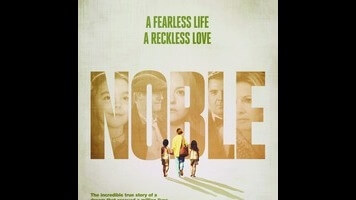A Noble biopic could have used the pop fizz of Danny Boyle

Noble follows its real-life title character Christina Noble from Dublin in 1955 to Birmingham, England, in the ’60s, to Vietnam in 1989, on a journey from impoverished Irish youth to helping equally impoverished kids in Ho Chi Minh City. Though the movie considers Noble’s endpoint her destiny, writer-director Stephen Bradley wisely avoids signaling this inevitability from the jump, instead cutting between her arrival in Vietnam and her progression from plucky kid to troubled young adult. He reveals the connections later, which means Noble takes a few entertaining detours on its way to boilerplate uplift.
The movie drops in on the youngest version of Christina (Gloria Cramer Curtis) while she wows an audience of adults with her singing, before rushing back to her less ebullient home life, as Bradley’s restless camera pans up the side of an apartment building and follows its heroine running through alleys. The director also heightens the melodrama of Christina’s early life to a sometimes cartoonish degree. Her father doesn’t just stagger home drunk; he kicks open the door and lays a room to waste in a drunken rage. Her mother doesn’t just cough to telegraph her sickliness; she blasts a lungful of blood onto her sweet daughter’s nicest dress.
Broad as they are, these early touches do make Noble livelier than a lot of inspirational-poverty dramas, and the movie’s sprint through traumatic events recalls Danny Boyle minus the pop fizz. Boyle might have made Christina’s lifelong hobby of breaking into song feel electric; here it gets a fustier outlet as she gloms onto Doris Day’s version of “Dream A Little Dream Of Me,” making this the rare movie set partially in the U.K. during the ’50s and ’60s that contains almost no rock music (and no, Coldplay playing over the end credits doesn’t count). Moreover, in Christina’s various incarnations—Sarah Greene plays her as a teenager, while Deirdre O’Kane takes over for the adult version—she doesn’t particularly connect to anyone else on-screen. She sings to whoever’s around her and talks to God occasionally, but the three Christinas are much more prominent than any other single character (and of course cannot share the screen with each other). This might make sense in a biopic of someone more famous, where audience members might be bringing in their own associations and images; it’s less useful when most of the Vietnamese people Christina encounters are thinly developed foils for her, rather than fully realized people.
The movie imagines that Christina Noble on her own suffices. It implies that the adult Christina is compellingly sardonic and no-nonsense because she makes lame cracks, like answering a stranger’s question about the reason for her trip to Vietnam with, “I could tell ya, but I’d have to kill ya,” and later telling some little kids that they’re “moving up in the world” when they ride an elevator for the first time. As the movie spends more time with the 1989 Christina, after the flashback scenes have sufficiently filled in her motivation, Noble gets talkier and flatter. By the time it reaches its emotional climax, the key scene feels almost brusque. The real Noble accomplished a lot, but the movie insists on giving her achievements a mystical and mythical dimension (treating a pivotal dream she has about Vietnam that guides her there as miraculous, even though she has clearly absorbed TV news about Vietnam in the ’60s) without the imagination to carry it off. In fairness to Bradley, that’s a difficult job; maybe even Danny Boyle would struggle with it.